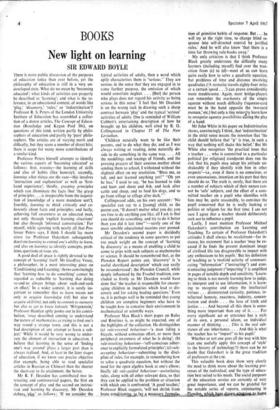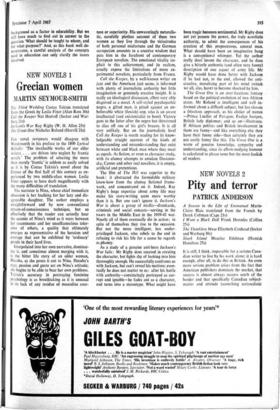New light on learning BOOKS
SIR EDWARD BOYLE
There is more public discussion of the purposes of education today than ever before, yet the philosophy of education is still in a very un- developed state. What do we mean by 'becoming educated'; what kinds of activities can properly be described as 'learning'; and what is the re- levance, in an educational context, of words like `play,' discovery,"rules,' or 'indoctrination'? Professor R. S. Peters of the London University Institute of Education has assembled a collec- tion of a dozen articles, The Concept of Educa- tion (Routledge and Kegan Paul 30s), on questions of this kind, written partly by philo- sophers of education and partly by 'pure' philo- sophers. The articles are of varying merit and difficulty, but they score a number of direct hits; there is scope for many more contributions of a similar kind.
Professor Peters himself attempts to identify the various aspects of 'becoming educated' as follows: first, training—the learning of skills and also of habits (like honesty); secondly, learning what things are the case—this involves 'instruction and explanation' as well as 'first- hand experience'; thirdly, grasping principles which can illuminate the facts (but 'the grasp of principles ... is inseparable from the acquisi- tion of knowledge of a more mundane sort'); fourthly, learning to think critically and co- herently about facts and principles; and lastly, achieving full awareness as an educated man, not only through 'explicit learning situations' but also through 'informal conversation.' For myself, while agreeing with nearly all that Pro- fessor Peters says, I think I should lay more stress (as Professor Oakeshott subsequently does) on learning to extend one's ability to learn, and also on learning to identify concepts, prob- lems, questions at issue, etc.
A good deal of space is rightly devoted to the concept of 'learning' itself. Mr Geoffrey Vesey, a philosopher, in a most interesting piece on `Conditioning and Learning,' shows convincingly that 'learning how to do something' cannot be regarded as reducible to 'learning that doing so-and-so always brings about such-and-such an effect.' In a wider context, it is surely im- portant to remember that to learn means not only to acquire knowledge (of) but also to acquire skill (in); not only to commit to memory but also to get to know (about). 'Wittgenstein,' Professor Hamlyn aptly points out in his contri- bution, 'once described coming to understand the nature of mathematics as trying to find one's way round a strange town, and this is not a bad description of any attempt to learn a sub- ject.' While it would be very wrong to under- rate the element of instruction in education, I believe that learning in the sense of 'finding one's way around' plays a larger part than is always realised. And, at least in the later stages of education, if we know our precise objective (for example, being able to read specialist articles in Russian or Chinese) then the shorter the short-cut to its attainment, the better.
Mr R. F. Dearden has contributed two in- teresting and controversial papers, the first on the concept of play and the second on instruc- tion and learning by discovery. Mr Dearden define:1/44:4y' as follows,: ate.lconAlder. typical activities of adults, then a word which aptly characterises them is "serious." They are serious in the sense that they are engaged in to some further purpose, the omission of which would constitute neglect. . . . [But] the person who plays does not regard his activity as being serious in this sense.' I feel that Mr Dearden is on the wrong tack in drawing such a sharp .contrast between 'play' and the typical 'serious' activities of adults. One is reminded of William Cobbett's entertaining description of how he brought up his children, well cited by R. G. Collingwood in Chapter 37 of The New Leviathan.
`Children naturally want to be like their parents, and to do what they do; and as I was always writing or reading, mine naturally de- side to do something in the same way. . . . All the meddlings and teasings of friends, and the pressing prayers of their anxious mother about sending them to school, I withstood without the slightest effect on my resolution. "Bless me, so tall, and not learned anything yet!" "Oh yes he has," I used to say, "he has learned to ride and hunt and shoot and fish, and look after cattle and sheep, and to feed his dogs, and to go from village to village after dark."' Collingwood adds, on his own account :• specialist can say to a [young] child, as the parent can, "It doesn't matter what you do; you are free to do anything you like; all I ask is that you should do something, and try to do it better than you did it last time" '—surely one of the most sensible educational maxims ever penned.
Mr Dearden's second paper is decidedly critical of the tendency in some quarters to put too much weight on the concept of 'learning by discovery' as a means of enabling a child to come to grips with such subjects as mathematics or science. It should be remembered that, as the Plowden Report points out, 'discovery' is 'a useful shorthand description' which can easily be misunderstood'; the Plowden Council, while deeply influenced by the Froebel tradition, con- cluded as firmly as Mr Dearden would have done that 'the teacher is responsible for encour- aging children in inquiries which lead to dis- covery and for asking leading questions.' Even so, it is perhaps well to be reminded that young children are complete beginners who have to be taught how to conceive their environment in mathematical or scientific ways.
Professor Max Black's short paper on Rules and Routines is, as might be expected, one of the highlights of the collection. He distinguishes (a) rule-covered behaviour—`a man riding a bicycle, without. conscious effort, or more than peripheral awareness of what he is doing'; (b) rule-invoking behaviour—'self-conscious adher- ence to explicitly formulated principles'; (c) rule- accepting behaviour—submitting to the disci- pline of rules, for example, in remembering how to solve a quadratic equation, but without the need for the open algebra book at one's elbow; finally (d) rule-guided behaviour—assimilating rules, along with all other relevant data, so that they can be applied to the problem or situation with which one is confronted. Y1/4 good teacher,' Professor Black suggests, 'will not shrink from tion of primitive habits of response. But ... he will try at the right time, to change blind re- sponse into self-directed control by justified rules.' And he will also know 'that there is a time for throwing rule-books away.'
My only criticism is that I think Professor Black greatly underrates the difficulty many learners (including myself) find over the tran- sition from (c) to (d)—most of us can learn quite easily how to solve a quadratic equation, but problems .6f time and distance involving quadratics CA motorist travels eighty-four miles at a certainn-Speed . . .') can prove considerably more troublesome. Again, most bridge-players can remember the mechanics of the simple squeeze without much difficulty (`squeeze-card must be in the hand opposite the two-card menace,' etc.) but only a tiny minolity learn how to recognise squeeze possibilities during the play of .a hand.
Mr John White in his paper on Indoctrination shows, convincingly I think, that 'indoctrination' in the strict sense means the intention that 'the child should believe that "p" is true, in such a way that nothing will shake this belief.' But Mr White also recognises 'the practical issue that a teacher . who is committed to a particular political [or religious] standpoint does run the risk that his pupils may adopt his attitude un- shakeably if they identify with him in other respects'—i.e., even if there is no conscious, or even unconscious, intention on his part that they should do so. The truth is, surely, that there are a number of subjects which of their nature can- not be 'safe' subjects, and the effect of a com- mitted teacher on a pupil who identifies with him may be, quite reasonably, to convince the pupil concerned that he is really looking at politics or religion for the first time. I am not sure I agree that a teacher should deliberately seek not to influence a pupil.
Lastly, I must mention Professor Michael Oakeshott's contribution on Learning and Teaching. To certain of Professor Oakeshott's attitudes I shall always be recalcitrant—for in- stance, his statement that a teacher 'may be ex- cused if he finds the present dominant image of civilised life too disagreeable to impart with any enthusiasm to his pupils.' But his definition of teaching as 'a twofold activity of communi- cating "information" ("instructing") and com- municating judgment ("imparting")' is amplified in pages of notable depth and sensitivity. 'Learn- ing to think is not merely learning how to judge, to interpret and to use information, it is learn- ing to recognise and enjoy the intellectual virtues . . . disinterested curiosity, patience, in- tellectual honesty, exactness, industry, concen- tration and doubt . . . the love of truth and justice. . . . And beyond all this there is some- thing more important than any of it. . . . For every significant act or utterance- has a style of its own, a personal idiom, an individual manner of thinking. . . . This is the real sub- stance of our inheritance. . . . And this is what the teacher has to "impart" to his pupil.'
Whether or not one goes all the way with him (can one usefully apply this concept of 'style' to the history of technology?) there can be no doubt that Oakeshott is in the 'great tradition of professors at the LSE.
This valuable book does show very clearly the need to think more about the learning pro- cesses of the individual, and the type of educa- tion best suited to his needs. The social purposes of the education service are certainly of very sreat importance, and we can be grateful for the notable series of reports, culminating in background as a factor in educability. But we still have much to find out in answer to the question 'What should be taught to whom, and for what purpose?' And, as this book well de- monstrates, a careful analysis of the concepts used in education can only clarify the issues involved.































 Previous page
Previous page